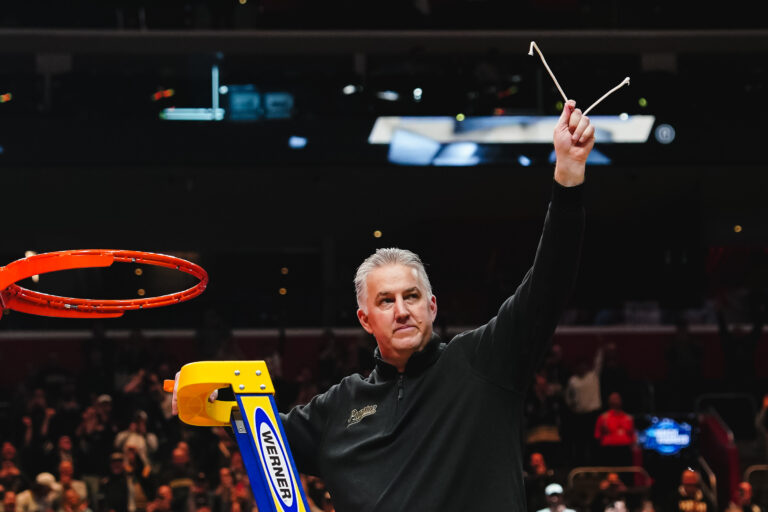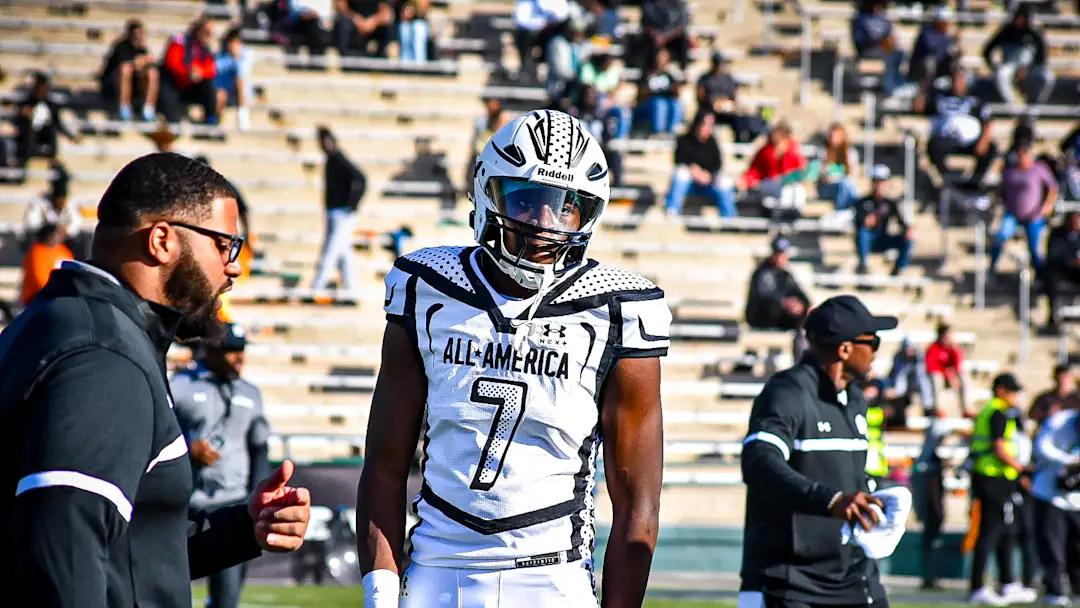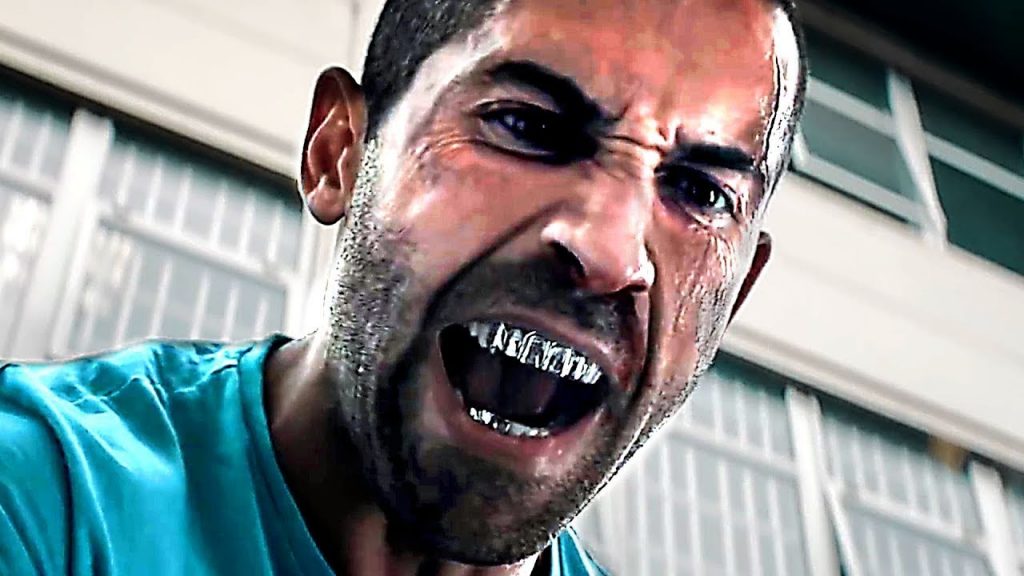Former Purdue basketball players happy to see Matt Painter, program make long-awaited trip to the Final Four In truth, Purdue’s men’s basketball coach is, at least to the outside world, as dispassionate as they come in terms of his line of work.
He is an even-keeled, analytical, process-oriented thinker who has appeared to become increasingly stoic as he has aged and gained experience. He has always approached his work in a professorial manner. His emotions hardly ever come through, much less take control.
But on March 31, just after his team defeated Tennessee in Detroit’s Little Caesars Arena to earn its first Final Four spot since 1980, he broke. The sight of Robbie Hummel was the trigger.
Painter adds, “I started crying because he was crying already.” “I don’t cry much—maybe at funerals, not during joyful occasions. I chuckle when I’m feeling happy.
However, it was simply an instance where realizing how much it meant to him… It was great to know that someone cared that much, in my opinion.
Matt Painter of Purdue Men’s Basketball of the Purdue Boilermakers Men’s Basketball team is seen on March 31st, 2024 during a game against the Tennessee Volunteers in Detroit, Mich. during the NCAA Tournament. After leading the Purdue men’s basketball team to their first Final Four since 1980, head coach Matt Painter ceremoniously tears down the net. (Image from Purdue Athletics.)
As a deeply committed Purdue basketball graduate and one of the team’s genuine favorite sons, Hummel was calling the action for Westwood One. As the Boilermakers mercilessly ended what was maybe the most historic victory in school history, Hummel, sitting courtside, became overcome with emotion and broke down in tears while listening to the spectacle unfold on the radio.
familial ties
That particular incident succinctly captured the ties that have always bound the Purdue program’s alumni to its past—ties that the program has long valued and endeavored to establish and uphold with individuals who wish to stay in its close-knit community.
Regarding that sense of community, former standout Dakota Mathias explains, “It’s the type of people they recruit into the program.” “The guys you’re enrolling in the program are all very similar—they’re hardworking, blue-collar workers who also happen to be decent people who care about other people.”
“Those are values we share, and having (those bonds) in that way is easy.”
Painter, who has been publicly criticized this season due to his first-round NCAA Tournament loss the previous year, shakes hands with Tennessee coach Rick Barnes (but not before getting a bear hug from the best player in his sport, Zach Edey). Painter then makes his way to Hummel to be interviewed for a national radio program.
Painter, an alumnus himself, was reminded at that point of around 2006, when Hummel and classmates E’Twaun Moore and JaJuan Johnson invested in a failing Purdue program, a recovery project he took on. At that point, the players could have chosen to play for any number of other, more seasoned victors.
Moore would follow in the footsteps of several former players and the tens of thousands of supporters who flocked to Glendale, Arizona, for the Final Four, one week after Purdue broke down those nets to win the Midwest Regional. Purdue had been waiting for this moment for a very long time and had been so close to it numerous times before breaking through.
Moore, who is 35 years old and recently retired from the NBA after ten years of play, adds, “It was good to go support the school after all Purdue did for me.” It enabled me to fulfill my aspirations and objectives.
“I remember how much I enjoyed watching former players like Kenny Lowe, Brian Cardinal, Brad Miller, and David Teague—people I grew up watching on TV—come back to play when I was a player (at Purdue). It was invaluable that they were returning and imparting some of their gaming expertise.
FaceTime with someone in Israel
But let’s go back to that Detroit scene.
When the confetti had all dropped and the tears had dried, Hummel went to Purdue’s locker room and huddled with several Purdue coaches and former teammate Bobby Riddell, who was on the local radio station, when a FaceTime call came in from all over the world. Johnson had been watching his alma mater’s Elite Eight game on streaming services while he was playing professionally in Israel.
To join in the celebration with his old teammate and anyone else he might get on the phone, he called Hummel.
According to Riddell, “JaJuan was his usual happy, gregarious self.”
Yes, in fact.
Johnson remarks from Israel, “I was so happy for Coach Painter, for the fans, the staff, pretty much anyone affiliated with Purdue.” “Having been involved from the beginning—when we were the Baby Boilers in 2007—to the present, I can’t believe how much work Coach Painter and the other guys have put in. The satisfaction of witnessing them arrive was immense.
It basically didn’t matter what these guys did because of last year’s first-round loss and all the hardships they had throughout the season—what mattered was what transpired during the NCAA Tournament. They answered.
Robbie Hummel played under Coach Matt Painter at Purdue from 2007 to 2012 before going on to play professionally for Team USA Basketball and the Minnesota Timberwolves of the NBA. He now calls games for Westwood One radio and works as an analyst for Fox, NBC, and Big Ten Network. (Image from Purdue Athletics.)
Hummel, Johnson’s lifelong friend and classmate, was one of the faces of Purdue’s salvation on this particular day. After the Tennessee game, staff members Paul Lusk and Elliot Bloom delayed their own celebrations to honor the former All-American. For a considerable amount of time, Hummel has been troubled by the idea of what might have been for both himself and Purdue if he had not sustained serious knee injuries during his third and fourth seasons in the program, which severely damaged both teams’ realistic chances of making it to the Final Four.
The teams that transformed Hummel, Moore, and Johnson were deprived of their finest opportunities to merit this moment.
The famous “Baby Boilers” foursome of freshmen in 2007 included E’Twaun Moore (left), JaJuan Johnson (center), Robbie Hummel (right), and Scott Martin (not visible). Although they left behind impressive legacies, they were unable to make it to the Final Four. (Image from Purdue Athletics.)
Those were two of the near misses that hurt Purdue and gave the impression that the glass ceiling might eventually break.
Ryan Cline was a member of the team that lost in one of the most unlikely finishes in the history of the competition. In the 2019 Elite Eight, Purdue came within a hair’s breadth of defeating eventual national champion Virginia.
Even though Cline would have like to participate in the Final Four, witnessing his former school succeed a few years later was therapeutic for him. It was a sense of atonement.
Although Cline said he has always had a great deal of pride in Purdue and its championship-laden past, he now feels a little more self-assured in his hometown of Carmel because the Final Four is now a part of its (current) history.
Cline remarks, “I am definitely carrying a little extra swagger knowing that Matt Painter has finally received his just desserts.”
Painter and Keady are a common thread.
Among five former Boilermakers who experienced those pivotal events in Purdue’s postseason history, a consensus quickly emerged. More than anything, they wanted this for their college coach. Purdue’s collective identity has always included the desire to succeed for the group as a whole rather than just for the individual.
Mathias, one of the several former Purdue players who flew to Phoenix for the Final Four, adds, “We all kind of had that same reaction (as Hummel).” “Given everything we’ve been through in the last ten to fifteen years—the heartaches in the tournament and everything Coach Painter has gone through—I think we’re all probably crying a little.”
After classmate and important player Isaac Haas injured his elbow in the tournament’s opening round, undermining that team’s hopes of making it to the Final Four, Mathias’ senior year came to an end in the Round of 16.
Any coach or player will tell you that competing in the NCAA Tournament is tough.
It typically boils down to the most basic component: chance.
In that regard, Purdue has often fallen short of expectations.
But this year, it took luck out of the picture. The seeds were all in the vicinity of Purdue until its national semifinal matchup with 11th-seeded North Carolina State. It defeated the top teams in its bracket, largely handily, to get to the national championship game.
And it drove out those old demons in the process.
According to Mathias, “watching it for Coach Paint was the best part of it.” “He’s received criticism without cause from non-basketball fans.” He was never in need of validation, so I believe that was a significant deal for him. Seeing that for him, as well as the men on that team, was fantastic. All of them are true Purdue boys. They’re excellent guys who play hard and act appropriately. The appropriate group was involved.
However, the redemption is several generations old.
Painter succeeded his college coach, the recently inducted Hall of Famer Gene Keady, at that position. The fact that Keady, who turned 88 on May 21, was present to share in the occasion was especially significant. As a further tribute to the bonds that have held this program together for so long, Edey ceremoniously brought a shred of the net to Keady after chopping off his portion of it.
Keady nearly made it during his 25 years at Purdue. Nobody wanted it more for Keady in 2000 than Purdue star Brian Cardinal, the quintessential heart-and-soul type who always referred to Keady as a father figure.
That year, Purdue lost by a score of one.
After making it to the Final Four, Matt Painter gives a warm hug to his mentor, Gene Keady, the men’s basketball coach at Purdue from 1980 to 2005. Painter was team captain and an honorable mention All-Big Ten player as a senior while playing for Keady from 1989 to 1993. (Image from Purdue Athletics.)
“It was extremely meaningful to me that he could attend and participate in it,” remarks Cardinal, who excelled from 1997 to 2000. “I’m so glad Paint was able to do it and get him there,” I messaged Paint, saying that one of my biggest regrets was not being able to get him there.
This Purdue season captivated former players as if they were still a part of the team. Purdue specifically wants them to feel that way. They actually do.
What united them was their shared desire for Painter’s success, much as Cardinal had long wished for Keady’s.
As for Hummel, who even lived in Painter’s house after graduating while recovering from an injury, “He does things the right way, he’s a good person and he cares about his players in a way that’s more than just, ‘I need you to win games for me,'” Hummel says. Although it doesn’t seem like it should be that difficult, that is undoubtedly not the norm in college basketball right now.
“He has done so much for the guys he has taught and gone above and beyond for so many guys behind the scenes. He’s brilliant when seen as a basketball mind. He simply lives the way he thinks (about) the game. He was destined to be this, in my opinion. He was supposed to be Purdue’s coach.
This was something he was always going to get. Not only is he an amazing coach, but he’s an even greater person. People support you when you treat them well, and it’s safe to say that they were cheering for him and Purdue to succeed in this.




